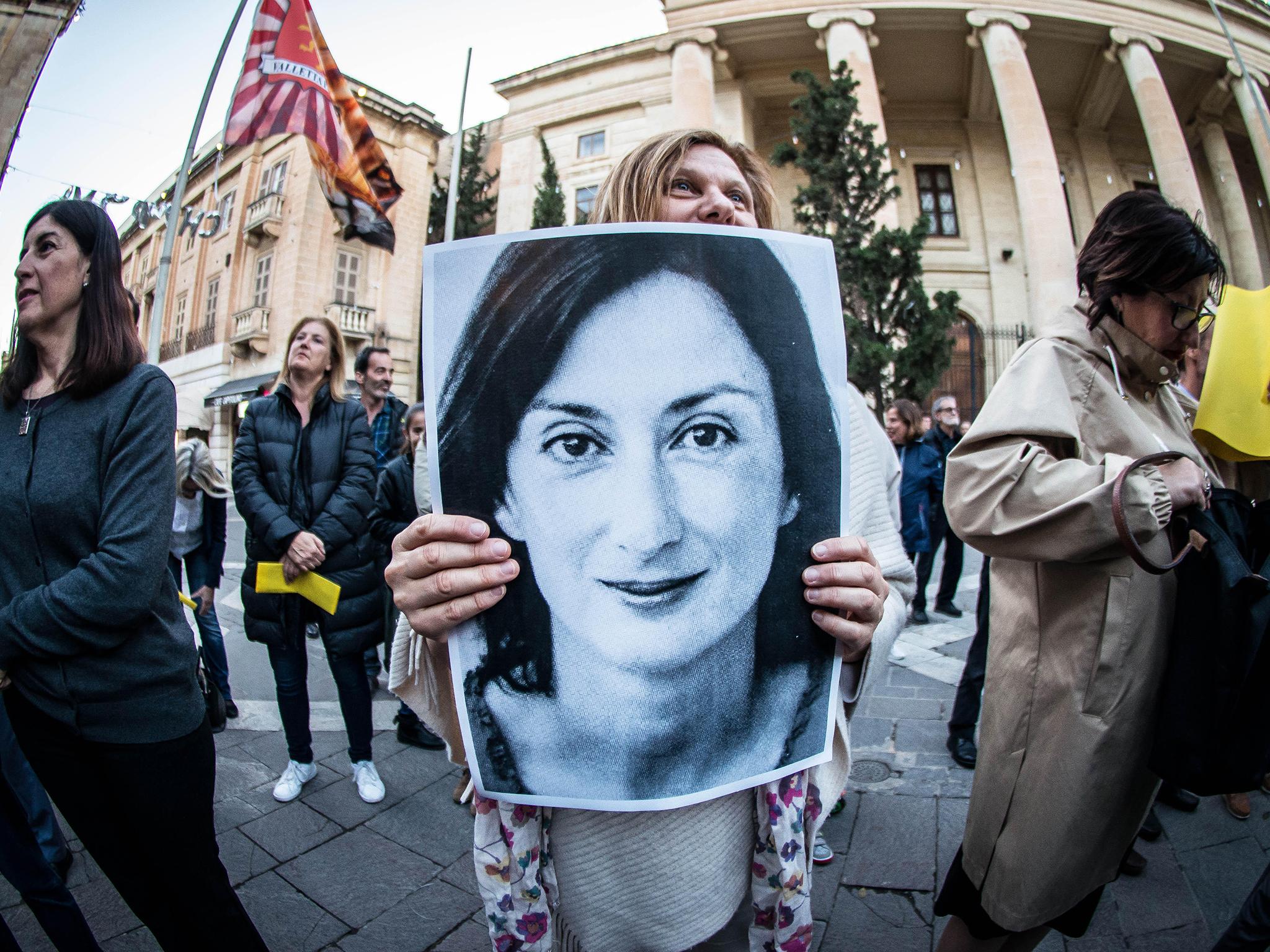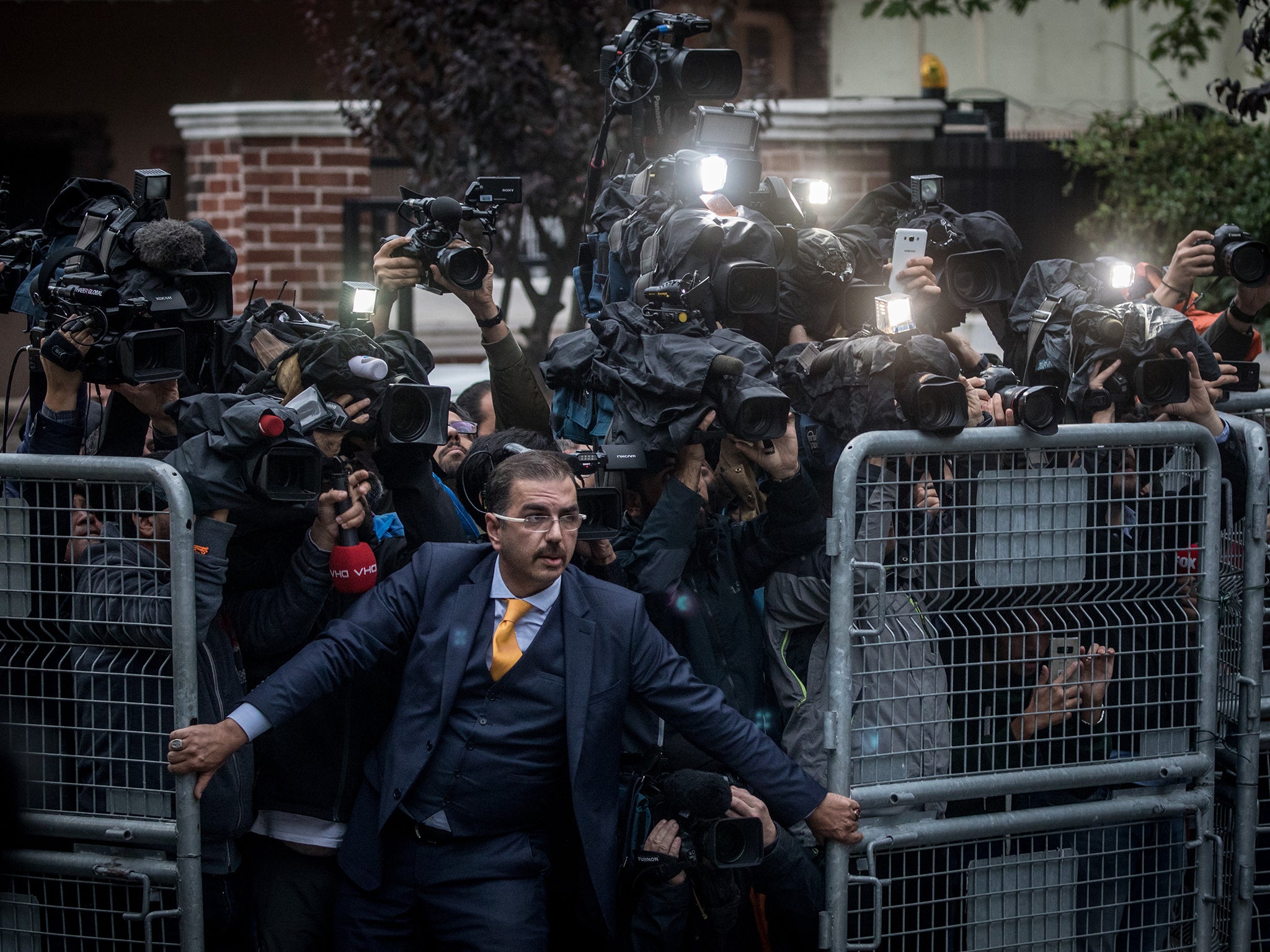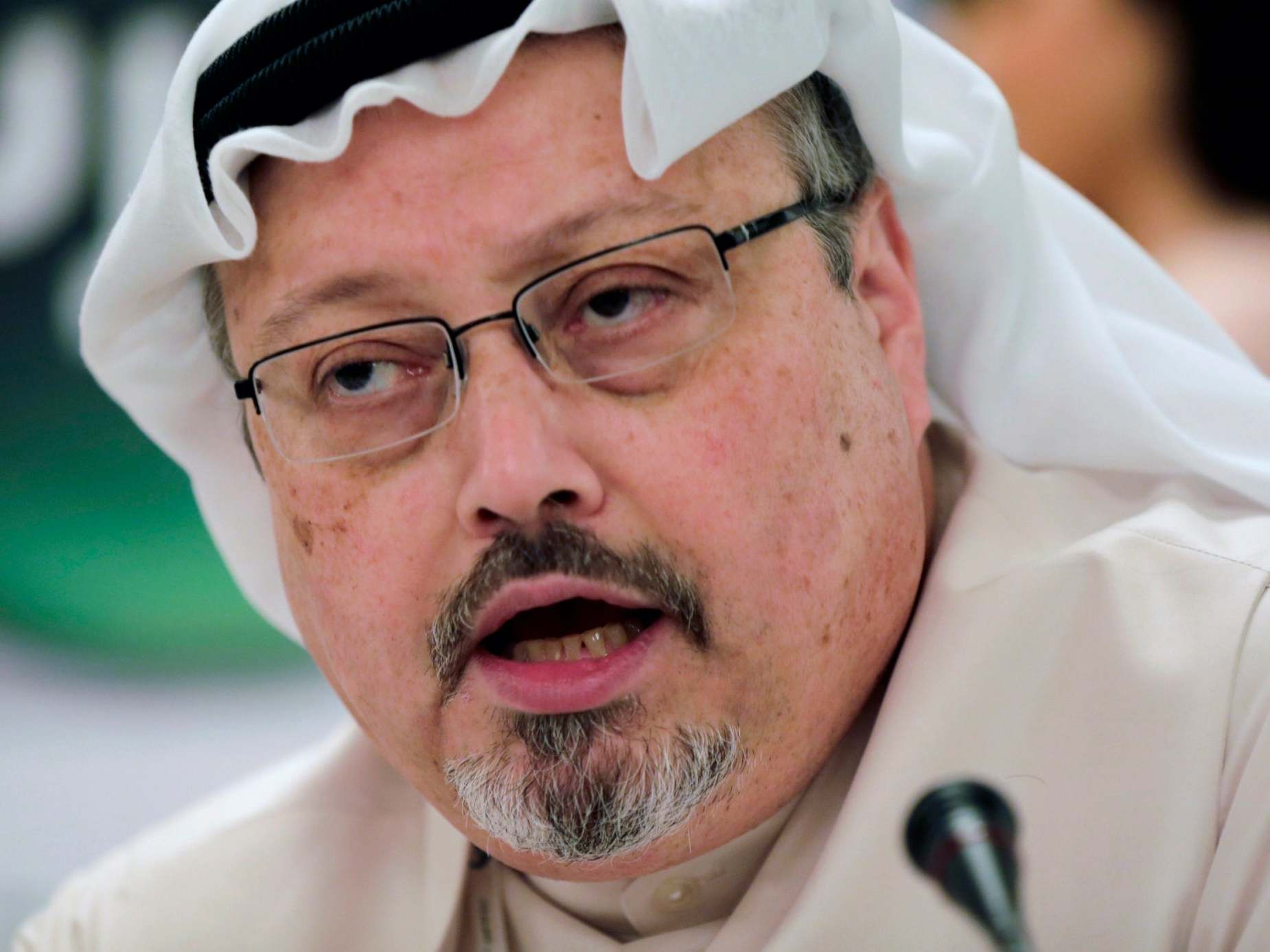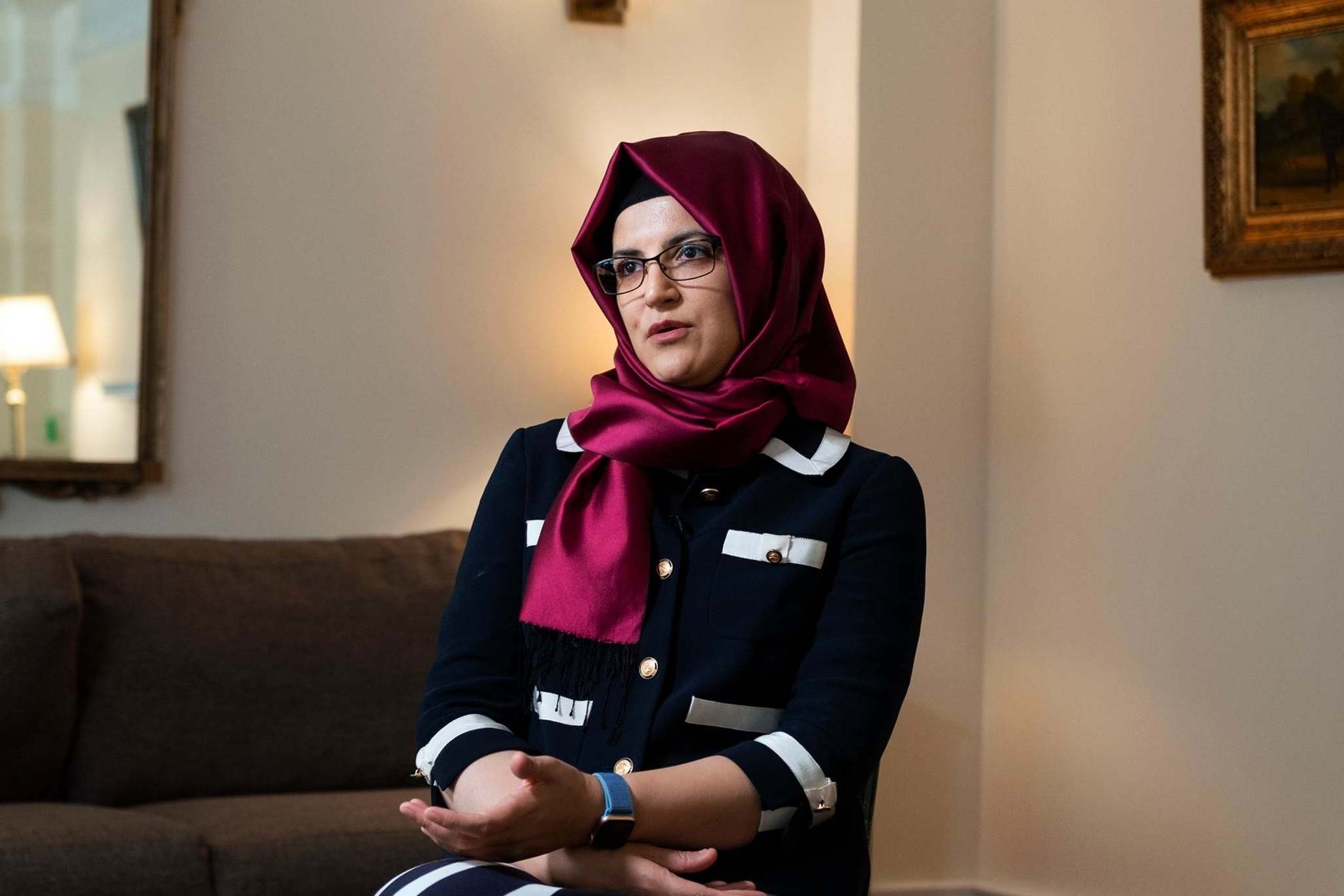‘It’s easier to kill the story by killing the journalist’
Not only are journalists increasingly the targets of violent crimes, but in this era of surging authoritarianism and right-wing nationalism, more often than not the perpetrators are getting away with it. And that is the biggest threat to press freedom, writes Borzou Daragahi


The murder of Jamal Khashoggi was merely the tip of the iceberg when it comes to the killing of journalists around the world. Before the dissident journalist was torn limb from limb by Saudi regime agents, there was reporter Jan Kuciak, who was shot dead, along with his girlfriend, in Slovakia, for looking too closely into ties between the Italian mafia and the government in Bratislava.
A year earlier there was the case of Daphne Caruana Galizia, a journalist killed in a car bomb in Malta, after reporting links between the government and organised crime; and before that was Michael Douglas Deane, shot dead by Egyptian regime forces while covering the unrest in Cairo in 2013. And then there’s Mexico where scores of journalists have been killed over the years by drug cartels in league with corrupt local officials.
Across the world last year, 94 journalists were killed, according to the International Federation of Journalists, up from 82 the previous year. So far in 2019, at least 16 journalists have been killed in the line of duty, according to a running tally established by the Committee to Protect Journalists, including in Ghana, Mexico, Honduras, the Philippines and Ukraine.
“What we are witnessing is an increasing intolerance of independent reporting, critical voices and investigative journalism,” says Agnes Callamard, the special United Nations rapporteur who investigated the killing of Khashoggi and issued a report about it in June. “That intolerance is growing in a number of countries, including democracies.”
But press freedom advocates say that the worst part isn’t that journalists doing their jobs are increasingly targeted for liquidation by the powerful. It’s that in an era of right-wing nationalism and surging authoritarianism, more often than not the perpetrators are getting away with it. Police, prosecutors and the courts are repeatedly failing to deliver justice for journalists who are killed. To press freedom advocates, the independent journalism that is a pillar of civil society and democracy is being disassembled piece by piece.
“We are watching the building burning down and we’re throwing water at it,” says Leon Willems, director of Free Press Unlimited, a Dutch media advocacy group that provides safety tools to journalists. “All of our life-saving work does not change a system where it’s almost cost-free to attack journalists. Governments, criminal organisations, armed factions now have absolutely no hesitation to attack journalists. There’s no judicial preventive mechanisms that make people pay for crimes against journalists.”
To respond to the lack of accountability, Willems’ organisation, along with the French-based group Reporters Sans Frontieres and the US-based Committee to Protect Journalists, have launched a project to employ teams of investigative reporters to examine crimes against journalists and bring them to justice, The Independent can reveal exclusively.

“We are planning to set up a people’s tribunal where we publicly lay out the entire foundations of cases of journalists being killed,” Willems says. “We will investigate cases thoroughly. Justice should be done. We see it is not happening.”
In an interview with 60 Minutes at the weekend, Crown Prince Mohammed bin Salman took full responsibility for the killing of Khashoggi, which was allegedly carried out by his own court’s deputies and security officials, but denied that he ordered the killing.
We are watching the building burning down and we’re throwing water at it. All of our life-saving work does not change a system where it’s almost cost-free to attack journalists
So far, the crown prince has paid little for his regime’s brutality, which includes extensive surveillance on numerous dissidents abroad and the jailing of civil society activists. Witness the spectacle of world leaders cosying up to the Saudi heir to the throne at the recent G20 summit in Osaka. The 2020 summit is still scheduled to be held in Riyadh.
Nations appear eager to return to business as usual with Saudi Arabia, which is among the world’s top exporters of oil and importers of weapons. As of yet, no one has been punished for the murder inside the Saudi consulate, despite an opaque trial reportedly unfolding in Riyadh. “We have learned that our elected officials are ultimately very prepared to turn a blind eye when they are confronted with a powerful state,” Callamard says. “G20 in Osaka was a very low moment.”
Despite Callamard’s extensive report, Khashoggi’s murder has not been taken seriously by either the Security Council, or any international court. That has angered and frustrated some, even within the UN family. “The United Nations itself has been silent,” says David Kaye, the special UN rapporteur on freedom of conscience. “Where is the system? Why could the secretary-general not initiate a high-level investigation himself, as many called for and as Turkey seemed willing to entertain?”

The Khashoggi matter has highlighted a glaring gap between the international community’s demands for answers, on the one hand, and any real action or ability to enforce justice, on the other. Like in many cases of journalists murdered by powerful players, there appears to be no international will to bring suspects to account.
“The lack of accountability can only undermine journalist protection, and the willingness of journalists to pursue hard stories in the most dangerous environments,” says Hans Laroes, chair of the European Editors in Chief Network. “It is a blow to media freedom even though it is only about one killing.” But Callamard insists it’s too early to conclude that justice has failed. She hasn’t given up, and neither should others, she said in an interview from the United Nations headquarters in New York last week.

She spent most of the General Assembly lobbying diplomats and other organisations to take action over Khashoggi. She is scheduled to be in Istanbul today to join in a public commemoration of the slain journalist on the anniversary of his killing. She continues to promote her report, and advocate for some kind of mechanism to punish powerful political leaders or criminal bosses who wrong journalists and human rights activists. “It has been only three months for the report, and one year since the killing,” she says. “This is a very short period. Accountability in the judicial sense of the word is going to take much longer. We need to be prepared for a long-term process.”
The lack of accountability can only undermine journalist protection, and the willingness of journalists to pursue hard stories in the most dangerous environments. It is a blow to media freedom even though it is only about one killing
The Khashoggi issue has also informed a model of sorts for keeping matters such as press freedom and human rights in the headlines, even when powerful actors would prefer to sweep bodies under the carpet. Over the months of research, Callamard says she learnt a lot about Khashoggi, his complexities and contradictions. Above all, she says, the aftermath of his killing showed her a new way of pressing forward on matters of human rights.
“We learnt that we are a resilient community,” she says. “We have the capacity and power to keep an issue on the international agenda. And to keep bothering, annoying and weakening a very powerful actor – in this case Saudi Arabia and some of its friends. We have become more aware of the power we have against very powerful actors.”
Some don’t want to wait for international organisations and governments to get round to taking up the case of murdered journalists. The idea for the people’s tribunal crystallised before the killing of Khashoggi but has taken on a new urgency since. Plans are still in their infancy. Those sketching it out envisage teams of experienced journalists and jurists probing cases together.

“The ones who reach a verdict should be beyond doubt; it’s not a political thing,” says Laroes, who is also project manager at Free Press Unlimited. “We will focus on journalists who have been murdered or investigations that have been stalled and those cases where there was no investigation at all.”
This underlying silent threat is deeply disturbing, not only for what it shows about unaccountable surveillance but for what it shows about the capacity and willingness of states to undermine reporting and association
By laying out its case to the public, the tribunal would hopefully force local authorities to act, and if not compel international bodies to get involved, perhaps issue arrest warrants or court summonses. “The problem is the investigations are carried out sloppily or hindered,” said Willems. “When local judicial authorities are failing, we need an international organisation to prosecute cases.”
Beyond the lack of justice for the Saudi journalist, there’s another disturbing dimension to the Khashoggi killing that alarms press advocates and human rights monitors: the targeted electronic surveillance of dissidents using sophisticated espionage tools across borders. Saudis allegedly used Israeli software to track Khashoggi and his colleagues, perhaps accessing his communications, and tracking his movements. The scheme was uncovered through the work of a Canadian group called Citizen Lab, which itself became the target of alleged espionage operations.
The entire episode hints at a terrifying new world of nations using cybertools to hunt down dissidents and thought criminals. “This underlying silent threat is deeply disturbing, not only for what it shows about unaccountable surveillance but for what it shows about the capacity and willingness of states to undermine reporting and association,” says Kaye.
Media advocacy groups have also detected a surge in all forms of harassment and direct targeting of journalists, perhaps spurred on by the anti-media rhetoric of populist right-wing leaders such as Donald Trump, the Phillippines’ Duterte Rodrigo, Russia’s Vladimir Putin, and Victor Orban in Hungary.
Trump has called the US media the “enemy of the people” and has repeatedly made dark jokes about physically harming journalists. At his rallies, he eggs on excited supporters that are menacing the journalists covering the events. It was only a little more than a year ago that a gunman stormed into a local newspaper in Maryland and killed five members of staff.
Like Trump, allegedly corrupt elites throughout the world see journalists poking their noses into their business as a threat to their lucrative scams. “Journalism is less valued, and there’s so much money around,” says Laroes. “It’s worth it to kill the stories by killing the journalists.”
Laroes estimated that for every 10 journalists killed around the world, only one case is brought to justice. “The basic problem we are facing is the problem of impunity,” he says. “That means there’s a kind of reward for killing journalists and stopping the stories that need to be told.”
Join our commenting forum
Join thought-provoking conversations, follow other Independent readers and see their replies
Comments